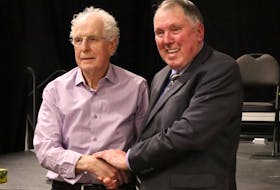
Whether it’s the birth of a child, a once-in-a-lifetime experience or a global disaster– it’s a moment to be revisited with a feeling like time has never passed.
For Reggie Collins, that moment is May 23, 1982.
A born-Canadian to British parents, Collins moved to England when he was 10 years old. It was there he endured relentless teasing for his Nova Scotian accent and his come-from-away upbringing.
“I did what any 10-year-old would do,” Collins chuckles before thickening his accent. “I adopted a British accent to stop the bullies.”
Collins father, Reginald Sr., had been a Second World War veteran with the Royal Navy. He was shipped to Canada in 1949 to help open 12 Wing Shearwater, where he raised his family. Following his retirement in 1990, the family moved back to Nova Scotia again, eventually settling in Truro.
It was eight years earlier, however, when the junior Reginald Collins decided to follow in his father’s footsteps.
Collins was at sea in April of 1982, working as shop manager on the SS Canberra – a world cruise ship. In the early days of the month, they received news of the Argentinian invasion of the Falkland Islands – an archipelago of British isles off the coast of South America.
It was suddenly all hands on deck for the Royal Navy. They were to convert the cruise ship into a military transporter within 24 hours.
“It was at the end of the cruise,” he recalled. “The captain wanted volunteers. All the crew, the concessionaires… we all volunteered to go down there.”
Collins and several others, who had already been at sea for six months or more, were told to stay behind. The ship had enough fresh legs to volunteer.
Disappointed, he returned to England immediately. One week later, however, the Navy called for a second ship to join the ranks – the MV Norland, a car ferry.
“Do not give us an answer straight away,” he recalled being told on the phone. “We know you need to speak with your family.”
Coming from a Navy family, Collins didn’t need to explain himself. He was going to war for his country – Canada.
In fact, Collins believes he may be the only Canadian citizen to take part in the 72-day war and receive the South Atlantic Medal for participation.
He shipped off to the Ascension Islands, a midway point between Europe and South America. The plan was to stay there and help stock the military ships. Plans changed, however.
“We’re going right in,” the captain told the crew. “If anyone wants to get off, you can get off now.”
Nobody departed, Collins said, and the Norland led the navy ships into the Falkland Islands, through what was known as “Bomb Alley.”
“Why would they send us in there first?” Collins wonders aloud before answering his own question. “It’s not a nice thing to say, but being a car ferry, they kind of thought of us as expendable.”
They survived the night, however, and the war kicked off in the coming hours. Every day after, the ships battled through Argentinian air raids.
On May 23, a pair of Argentinian aircraft struck the HMS Antelope, a Royal Navy ship within sight of the Norland. Miraculously, neither bomb detonated on impact. A pair of bomb disposal techs were sent from the Norland to alleviate the situation, which ultimately ended up going awry.
“Halfway through the night, night turned into day,” Collins recalled of the explosion. “The next day we went up on deck and saw her back broken in half.”
Collins and the Norland’s crew began taking on survivors, some severely injured.
“They were in such a hell of a state,” he said, tearing up.
That night, along with many other sleepless nights, has left Collins suffering from post-traumatic stress disorder. It struck him hard when he returned home after the war and saw a photograph of bombs hitting the water on either side of the ship.
“I heard those bombs. I heard them go off. And I still hear them in my nightmares,” he said. “I believe it will be with me for the rest of my life.”
Collins is only now sharing his story, 33 years later, and three years since his father’s death.
“A lot of people wonder why I never brought this story up before, but it’s because it’s something I don’t like talking about,” Collins said. “It’s for my father. All he wanted was for the government of Canada and the people to know that his son was there, representing his country.”
Through sharing his story, the events of May 23 have gotten a little easier to handle.
“The PTSD used to control me,” he said. “I went through bad bouts of depression, through bad bouts of anger. But through self-healing, it no longer controls me.
“I now control it.”








